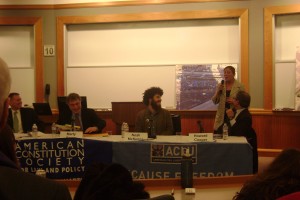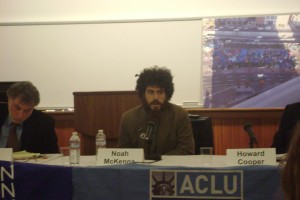On February 13th, 2012, at 6pm, inside Classroom 315 at Suffolk University, many law students, Occupy Boston supporters and curious individuals gathered to hear a panel titled “Occupy Boston: The Rise of the Tent City and Its First Amendment Implications,” regarding the legal significance and precedence behind the Occupy Boston encampment and evictions faced throughout it’s existence. Opening remarks covering the history of the Occupy Boston encampment were presented by Carol Rose, Executive Director of the ACLU of Massachusetts, while the Moderator was Marty Baron, Editor of The Boston Globe. The panelists were Bill Sinnott, Corporation Counsel of the City of Boston, Noah McKenna, a member of Occupy Boston and named plaintiff, and finally Howard Cooper, Lead Counsel for Occupy Boston plaintiffs, founding partner, Todd & Weld LLP. This particular event was co-sponsored by the ACLU of Massachusetts and Boston Lawyer Chapter of the American Constitution Society.
The first in the panel to speak was activist Noah McKenna regarding why exactly he joined Occupy Boston and following such, Bill Sinnott, explained the thoughts and opinions of Mayor Menino and his Administration, including elements taking part during the nights of October 11th and December 10th that resulted in arrests of a total of 179 protesters. Howard Cooper than spoke on what legal basis by which he was defending Occupy Boston in court in favor of their rights. Further into the discussion, the health and safety of the protesters and what they did to meet the requirements of the health and safety officials, which was frequently stonewalled by police during the time of the encampment.
At some point, a participant asked a question relating to the decision Citzens United vs. Federal Election Commission (2010), which paved the way for the creation of independent expenditure political action committees (or PACs), which overruled Austin v. Michigan Chamber of Commerce (1990) and partially McConnell v. Federal Election Commission (2003), by allowing corporations to fund politicians as a method of “speaking” whereas the protesters who had in court tried to uphold that their actions were fundamentally First Amendments Rights protected by the Constitution.
Another participant also referenced the recent Montana Supreme Court rejection of the decision on Citizens United vs. FEC, which occurred on Dec 30, 2011, which argues that the U.S. Supreme Court’s landmark decision in Citizens United vs. FEC did not apply to Montana’s century-old ban on direct corporate election spending, due to the state presenting extensive evidence of actual corruption, something of which the U.S. Supreme Court found lacking in Citizens United.
Due to a class needing the room immediately following the Panel, at 9pm, the crowd quickly dispersed.
Here is a clip from the panel.





